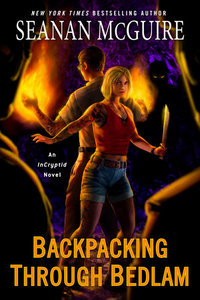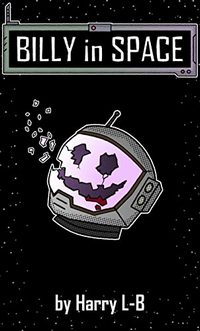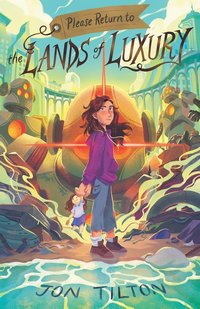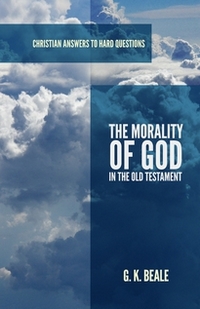by Jon Tilton
DETAILS:
Series: The Lands of Luxury, #1
Publisher: Blueberry Finch
Publication Date: March 21, 2023
Format: eBook
Length: 188 pg.
Read Date: March 22-23, 2023

What’s Please Return to the Lands of Luxury About?
Jane, Timothy, and Rodney are three children living in the community of Yarborough. Yarborough is a small(ish) group of people living on an island of trash. I’m not being metaphorical here—it’s a landmass that serves as a dumping ground for the refuse of the rest of the world (at least a continent). Like the rest of their neighbors, the children spend their days scavenging for things they can use and eat out of the refuse. Robots that run the place provide a daily allowance of water for each resident.
One day Jane finds a doll—almost pristine in condition—the nicest thing she or her friends can remember finding. The boys encourage her to cherish it and take it for her own—but the one who can read tells her that the attached tag says, “Please return to Gloria Thatcher.” It includes an address—in Paradise City, the source of the rubbish they live off of and among.
Jane knows that if she’d lost something so fantastic she’d be heartbroken without it—and she has the means to get it back into Gloria’s hands. She only has to risk her life to escape the island and make it to Paradise City. It seems like the right thing to do—and it shouldn’t take that long, she can probably get it done and be back in time for the next water distribution.
Her friends try to talk her out of it—but they fail. Once they realize she’s gone, they attempt to find and rescue her.
All three of them end up in dangerous situations—for both their physical and emotional well-being—and end up learning a lot about the world they live in.
It’s Dystopian, but Not
Most Dystopian novels are about people realizing the problems in their particular dystopia—or realizing they have the opportunity and ability to fight against those problems. I have nothing against those novels—I have (and likely will continue to) like many of those.
What I appreciate more (at least I think I do…maybe I’ll take this sentence back) is another kind of dystopian novel. The protagonists are sometimes aware the system is rigged, that things could be better. Sometimes, they don’t realize that’s where they are—like the fish who doesn’t realize it’s wet, it’s just life. But they press on, making do with what they have—or making things a little nicer for themselves and those around them—however temporarily. Those seem more realistic, more relatable, you know?
This falls into the latter camp—the people (even the kids) in Yarborough realize that life is hard and that theirs is harder than most. They don’t spend time dreaming of social change, of bettering their station in life, or anything like that. They’re surviving, helping each other, and trying to stay alive—finding joy in little treasures they find and in each other (and in hiding a harmonica from someone who doesn’t know how to play one, but keeps trying anyway*).
* Any parent—including, at one point, my own—can relate to this move. Yes, it’s mean—but it’s merciful to everyone else.
Stand-Alone vs. Series
This is kind of related to the previous point—I was a little discouraged to learn that this is part of a planned trilogy (at least, maybe more). I liked visiting this world and not having any real explanation for how things got to this point. How society evolved in the way it did, how a community emerged on a trash pile that should be bereft of life, what may happen now that some people in Paradise City know that the government and/or company have been lying to them about what goes on on the trash piles, and so on.
Sure, I was mildly curious, but I was more invested in the story than the world.
But now, to tell the story of Jane, Rodney, and Timothy after this book, we’ll need answers to the above—and maybe more—if the story is going to hold up. And I can’t imagine that the answers will make this a more interesting place—or that the following stories will match this one. Also, I’m a little worried that it’s going to end up being preachy—always a danger for books aimed at this audience, and I think the danger is greater in a dystopian world.
I hope that Tilton is able to make me eat my words and that he delivers a satisfying series. But at the moment, this story is enough time in the world for me.
So, what did I think about Please Return to the Lands of Luxury?
My finger is not on the pulse of MG fiction—I don’t know that in the recent resurgence of dystopian fiction (especially on the YA front) if it’s carried over into the MG world too much. I can remember a little bit of it from when I was that young, but I don’t remember my kids reading much like that. So take everything I say about MG dystopian fiction with a grain of salt.
I really liked the way that Tilton presented this world. Sure, there are things I’m not sure are all that consistent. For example, I don’t know how or why Timothy learned to read—particularly as much as he does. I absolutely get why Rodney and Jane can’t. There’s a lot about the culture in Yarborough that I don’t understand—and it’s fine, I don’t need to for this novel. But what we saw was enough. The tech makes sense (both the good and the bad about it), the consumerism seems more realistic than what we see in most dystopian fiction, and so on. And it was all really well communicated to be understood by the target audience.
The characters were great—everyone was well-designed. I liked how the adults in Paradise City were earnest, caring, well-intentioned, and clueless about what they were doing. Given time and a little opportunity for thought, I think the latter could work itself out. They just didn’t have the time to wrap their brains around what was happening in order to be anything other than clueless. But the way they stepped up when presented with the need and opportunity is exactly the kind of thing I like seeing in MG fiction.
It was exciting enough—with good tension (even if it was pretty easy to see who would survive and how—at least for older readers). But as good as the life-and-death material was, the interpersonal relationships were better. It mattered more how Rodney and Timothy got past the mutual offenses than if they lived. I cared more about Jane’s feelings, misunderstandings, and care for her home and friends than I did about the danger she faced—and so on. Tilton did a good job balancing all the aspects of this novel—and majored on the right aspects when he had to make a choice.
A quick aside—this cover just pops! It feels playful and vibrant, but there’s something undeniably ominous in those robots—so, you know, it matches the book. Sylvia Bi did a great job on this cover.
Misgivings about the next books aside, I’m coming back for them. I recommend Please Return to the Lands of Luxury for adults who find the idea of MG dystopian fiction intriguing and I heartily recommend it to anyone who might be shopping for an MG reader.

This post contains an affiliate link. If you purchase from it, I will get a small commission at no additional cost to you. As always, the opinions expressed are my own.

 The Ballad of Bonaduke—
The Ballad of Bonaduke—

![]()








